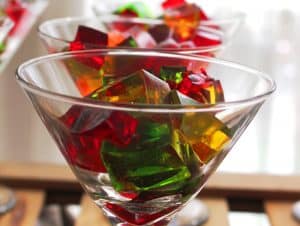Gelatin can help reduce your appetite.
I recent visitor to the website asked a novel question after reading an article in a health magazine. It is interesting because I have personally never seen anything to support using gelatin for weight loss, but why let this hinder my ability to research the topic. If gelatin does help with weight loss, I am confident that they are not talking about that sugar-sweetened box of artificially colored, flavored, and sweetened sugar-laden boxes of powder we make that becomes that jiggling dessert because of the number of empty calories it contains.
So what is gelatin? Gelatin is a translucent, colorless flavorless food additive derived from collagen obtained from various animal body parts. Simply, it is a mixture of peptides and proteins produced by partial hydrolysis of collagen from the skin, bones, and connective tissues of animals. Collagen is a connective tissue found in every animal. Gelatin is commonly used as a gelling or thickening agent. It is even used as a part of many capsules and pills so your medication may or may not be vegan. The gelatin added to food comes in multiple forms, but you are probably most familiar with the powder.
The best part is that gelatin is carbohydrate, fat, and sugar-free as long as you buy the unflavored version. It is nearly 100% amino acid. Amino acids
Studies show gelatin may help you lose weight. Since gelatin is basically a mixture of amino acids, which are the building blocks of protein, it only makes sense that gelatin would help with weight loss and to improve satiety. I have already written on research on whey protein and satiety and weight loss effects of high protein. I do not doubt that collagen and gelatin would have a similar effect but let’s get on with the research.
The first study to attack this question is from the Journal of Eating and Weight Disorder[1]. The researchers looked at the gut hormones ghrelin, peptide YY, and glucagon-like peptide-1 after subjects were given 20 grams of gelatin. Plasma samples were collected at-30- minute intervals for 180 minutes to test for glucose, insulin, and gut hormones. The study found that a single gelatin meal induces a rise in plasma glucagon-like peptide-1 followed by an increase in serum levels of insulin. This finding should correlate to satiety because glucagon-like peptide-1 has been tied to satiety in the past. In this study, based on reports from the subjects, it did increase satiety among the text group.
This study is not alone. Another study looked at 23 healthy people with either gelatin or casein (a milk protein). The purpose of this study was to look at casein versus gelatin, and the researchers hypothesized that the complete protein, casein, would be superior to the incomplete protein or peptide (gelatin). Subjects were fed one of the two as the only protein in their diet for 36 hours. During a 36-hour study, 23 healthy men and women consumed four isoenergetic diets. The researchers found that gelatin reduced hunger more than casein and the researcher estimated it was 44% more effective at suppressing appetite than casein[2].
The bottom line: Many studies have found that a high-protein diet can help reduce your appetite. Research indicates that gelatin appears to be superior to other proteins at reducing your appetite. More research is needed, but this may indicate that gelatin might have a role in weight loss and appetite control.
References:
-
Hochstenbach-Waelen, A, MS Westerterp-Plantenga, MA Veldhorst, and KR Westerterp. “Single-Protein Casein and Gelatin Diets Affect Energy Expenditure Similarly but Substrate Balance and Appetite Differently in Adults.” The Journal of Nutrition 139, no. 12 (December 1, 2009): 2285–92. [PubMed]
-
Rubio, IG, G Castro, AC Zanini, and G Medeiros-Neto. “Oral Ingestion of a Hydrolyzed Gelatin Meal in Subjects with Normal Weight and in Obese Patients: Postprandial Effect on Circulating Gut Peptides, Glucose and Insulin.” Eating and Weight Disorders : EWD 13, no. 1 (March 1, 2008): 48–53. [PubMed]







Be the first to comment on "Visitor Question: Can Gelatin Help with Weight Loss?"